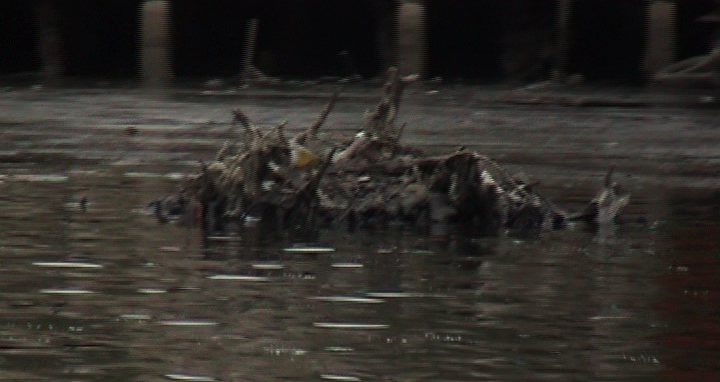STAGING CITIES/CIUDADES EN ESCENA. Una asamblea de humanos y no humanos en la cuenca del Matanzas-Riachuelo from m7red on Vimeo.
Thought and action centered in social scenarios and individual humans became insufficient to understand the growing complexity of the urbanization phenomenon and ecosystemic crisis. This pushed us in 2007 to the construction of a scenario for the City of Buenos Aires: the Riachuelo-Matanza River basin, its nascent process of recomposition.
Since the time of the Viceroyalty, the rivulet (“Riachuelo” in Spanish, hence its name) has been more an ecological and political battlefield than a natural ecosystem. The ecological questions that are posited in this scenario appear as controversies and uncertainties; the encounters take place between very heterogeneous actors.
Black waters, precarious populations, governmental agencies, polluting industries, technicians, residues, etc. But we must consider an ecosystem as a sort of assembly without walls, inside of which many types of these “interlocutors” can “have a voice”. Then, how to create an urban theater in which humans as much as non-humans have a voice in this public controversy? 
A scenic device was designed by a roundtable of six people, coming from diverse backgrounds, along with an artificial entity that interpellated them. The goal of the device was making appear and giving voice, collectively, to a privileged actor in this scenario: the basin’s “shit and urban pollution”. We could say that it’s a “mediumistic” process, but what makes itself heard is not a pure and identical spirit, rather an impossible assembly of hydric dynamics, vegetal and animal species, neighborhoods and human groups, administrative divisions, political vectors, infrastructures, economic flows and flows of shit, that may be called «basin».
Credits:
- Seminar: “International Seminar on Instant Urbanism, Hospitality and Accelerated History, hosted by Het Blauwe Huis, IJburg, Amsterdam, Netherlands, August 7th 2009.
- Character casting: Staging Cities, Chatheater, Matanza-Riachuelo River Basin scenario, with the help of the Cultural Center for Spain in Buenos Aires (CCEBA), Buenos Aires, Argentina, 2008-2009.
- Public brainstorming, videoshoot and editing with the help of the Cultural Center for Spain in Buenos Aires (CCEBA), Buenos Aires, Argentina, December 2008.
- Roundtable: “Road Trip”. Debate over new formats of discussion and urban imagination, Cultural Center for Spain in Buenos Aires (CCEBA), Buenos Aires, Argentina, May 13th 2009.
- Presentation and workshop: “Escenarios futuros de la política y la ecología en Buenos Aires. Ciudades en escena” (Future scenarios for politics and ecology in Buenos Aires. Cities in stage). Center for Contemporary Architecture Studies, belonging to the Torcuato Di Tella University, Buenos Aires, Argentina, August 14th 2009.
- Presentation of the video “Staging Cities/Ciudades en Escena. Una asamblea de humanos y no humanos en la cuenca del Matanzas-Riachuelo” (Staging Cities: An assembly of humans and non humans in the Matanza-Riachuelo River Basin) in Voices From The Waters, 4th International Film Festival on Water, in association with the Alliance Française de Bangalore. Bangalore, Karnataka, India, September 5th 2009.
- Projection and roundtable: “Staging Cities/Ciudades en Escena. Una asamblea de humanos y no humanos en la cuenca del Matanzas-Riachuelo” (Staging Cities: An assembly of humans and non humans in the Matanza-Riachuelo River Basin), part of “IMÁGENES EN MOVIMIENTO: arquitectura, ciudad y territorio” (Images in motions: architecture, city and territory), programming of Espacio Microcine at the XII International Architecture Biennale of Buenos Aires. Roundtable participants: Alejandro Valls Rossi, Marcelo Weissel and Lucas Rubinich. Recoleta Cultural Center, Buenos Aires, Argentina, October 3rd to 12th, 2009.
- Filming of the video: “El dispositivo: Brainstorming y voz no humana” (The device: Brainstorming and non human voice). Participants: Gustavo Dieguez (architect, recycling laboratory). Juan Pablo Gómez (playwright, director). Daniela Gutiérrez (FLACSO – Latin American Faculty of Social Sciences, editor at Manantial). Agustina Mazzini (environmental lawyer). Jorge Francisco Liernur (Director of the Architecture department at the Torcuato Di Tella University). Basurama, Madrid based collective studying trash in all its formats. Camera and editing: Julián D’angiolillo. Camera: Julia Masvernat. Production team: Paola Salaberri, Martin Dipeco, Noelia Leonzio. Sound: Pablo Chimenti, Hernan Kerllenevich. Special thanks to: La Boca Fine Arts Museum “Benito Quinquela Martín”, Historic Museum Hospital “Bernardino Rivadavia”, Foundation for La Boca, musical group “Los hijos de Zas”.

